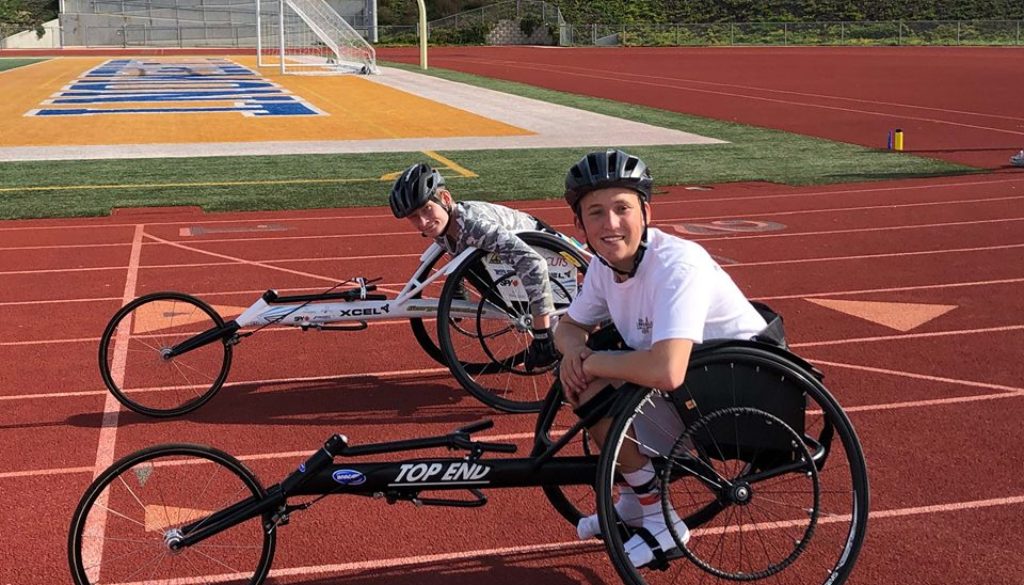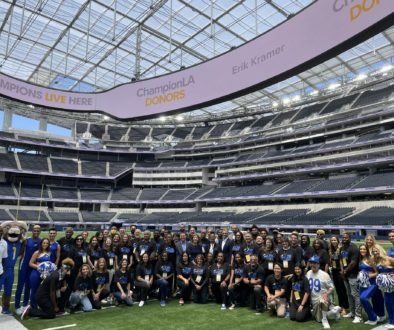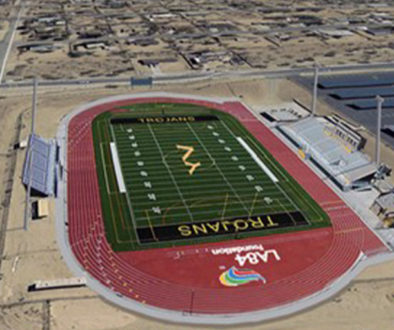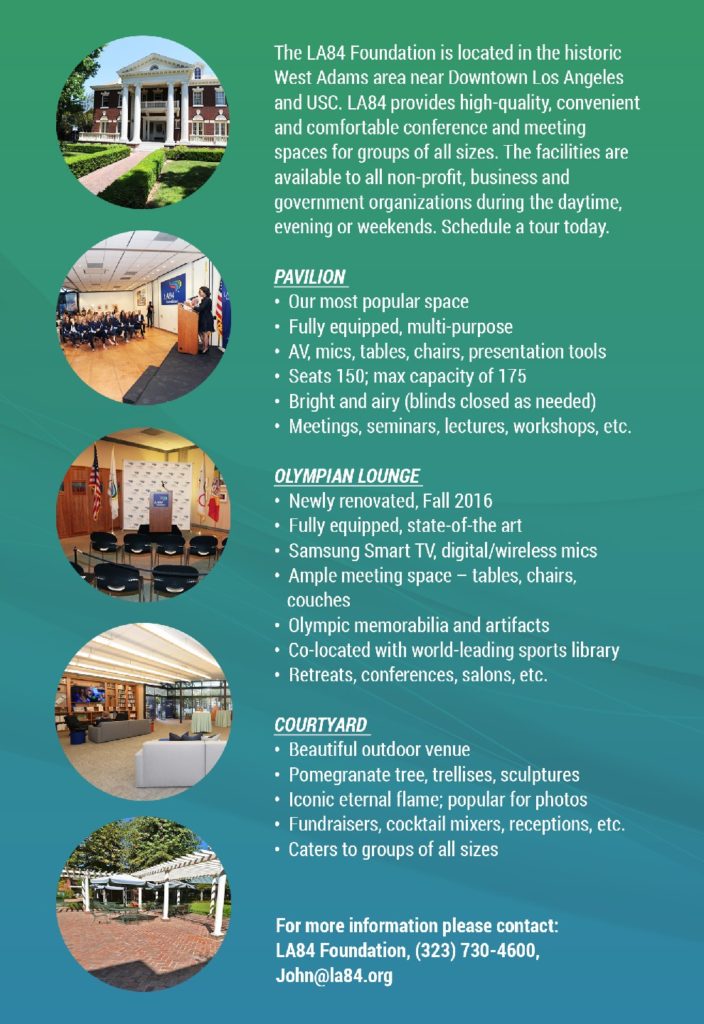LA84 Foundation Releases Southern California Adaptive Youth Sports Report
LOS ANGELES – Today the LA84 Foundation releases the findings of the LA84 Foundation Adaptive Youth Sports Report. The report is an important step in the LA84 Foundation’s campaign to ensure Play Equity by increasing opportunities for young people with physical disabilities to participate in adaptive sports. Based on these findings the LA84 Foundation will pursue partnerships with organizations that share their vision.
“In the past there has only been anecdotal information available, so this report allows us to see where there is opportunity for children with physical disabilities to have increased access to adaptive sports,” said Renata Simril, LA84 Foundation President & CEO.
The report utilized U.S. Census data, interviews with young adaptive athletes, and interviews with administrators of adaptive sports programs, U.S. Census staff and experts at the University of Southern California. The report does the following:
- Estimates the number of young people, under 18 years old, in Southern California who have a physical disability but no intellectual disability.
- Surveys a sample of existing adaptive sports programs serving young people to understand the perspectives of young athletes, their parents and program administrators.
- Discusses the barriers to participation in adaptive sports.
- Examines the factors that encourage young people’s participation in adaptive sports.
- Recommends the most effective ways to increase adaptive sports opportunities for young people.
The six recommendations to increase adaptive sports opportunities are as follows:
- Promote cooperative ventures – Adaptive sports providers and advocates in Southern California should create a formal network to share information, publicize adaptive sports opportunities, coordinate services and avoid duplication of effort.
- Replication of existing programs in new areas – Travel distances and travel costs are major impediments to greater participation in adaptive sports. Replicating existing programs in new locations is one way to combat the problem.
- More staff and coaches – Program expansion and replication will require additional staff and coaches, who will need training.
- Team sports – Athletes and families report that the social dimension of team sports is an important benefit. Also, team activities can be funded more efficiently than sports practiced by individual athletes.
- Non-school programs – Few, if any, single schools have enough adaptive athletes to form a team. There are several experienced adaptive sports providers who offer excellent programs that draw on athletes across school districts. The foundation’s focus on non-school programs in no way absolves school officials of their legal obligation to meet the needs of individual adaptive athletes who wish to participate in interscholastic sports.
- Individual sports – Funders should be responsive to a variety of sports preferences. Not every physically disabled kid will want to play a team sport. Sports in which athletes compete individually, but score points in a team environment such as track and field, tennis, and swimming provide important opportunities for adaptive athletes to compete – sometimes on the same teams as other athletes – in competitions ranging from club to high school to even state and national settings.
Below is a summary of the key findings of the LA84 Foundation Adaptive Youth Sports Report:
Population: There are at least 31,000 young people, between the ages of 5 and 17, with an ambulatory, visual or hearing impairment exclusive of some other type of disability in the 46,000 square-mile region of Southern California served by the LA84 Foundation.
Barriers to Participation: A myriad of personal, social and environmental barriers restrict youth participation in adaptive sports. They include the physical disability itself, fear of stigmatization, fear of injury, lack of confidence, others’ misconceptions about what adaptive athletes can achieve, uninviting attitudes of people without disabilities, too few trained coaches and sports staff, the small number of organized adaptive sports programs, equipment and facility costs, the cost and difficulty of travel to practices and competitions, underfunding, lack of awareness of existing opportunities, and difficulty connecting with other adaptive athletes.
Factors Promoting Participation in Adaptive Sports: The factors that encourage youth engagement with adaptive sports are similar to those found throughout youth sports: the opportunity to interact with peers, the desire to learn new skills and be challenged, awareness of programs, role models, parental support, and enough financial support to create good programs and support participation.
Elevating the Voice of Paralympians through Oral History
Additionally, the LA84 Foundation is dedicated to elevating the voice of some of the greatest U.S. Paralympians in history and has made their oral histories available. The following oral histories can be accessed at https://dev.la84.org/adaptive-sports/.
- Marty Ball – Push Rim Wheelchair Racer & Wheelchair Design Expert
- Candace Cable – Paralympian (1980-2004), Winter Paralympian (1992-2006), Olympic Games 1984
- Lex Gillette – Paralympian (2004-2016)
- April Holmes – Paralympian (2004-2016)
- Scot Hollonbeck – Paralympian (1992-2004), Olympic Games (1992-2004)
- Deborah McFadden – Adaptive Sport and Paralympics Advocate & U.S. Commissioner of Disabilities, 1989-1993
- Tatyana McFadden – Paralympian (2004-2016), Winter Paralympian (2014)
- Shirley Reilly – Paralympian (2004-2016)
About the LA84 Foundation
The LA84 Foundation is a nationally recognized leader in support of youth sport programs and public education about the role of sports in positive youth development. The foundation, with 35 years of on-the-ground experience, has supported thousands of Southern California youth sports organizations through grant making and funding facilities and fields of play, while also training coaches, commissioning research, convening conferences and acting as a national thought leader on important issues in the youth sports industry. LA84 levels the playing field to ensure all youth have access and opportunity despite economics, gender or ability, while elevating the field of youth sports as an integral pathway to lifelong well-being. To learn more and join the #PlayForAll movement or our Play Equity campaign, visit www.la84.org and @LA84Foundation on Twitter and Instagram.





